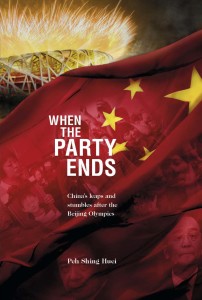WRITES TOM PLATE (in his symdicated newspaper column) – Have I been wrong? Some critics suggest my newspaper columns since 1995 on the politics and economics of the Mainland have been (oh …  ) overly sympathetic toward China.
) overly sympathetic toward China.
I just don’t know. But no one can afford to be complacent. And so the worry popped up again, for several reasons. One was as I was leaving Walt Disney Concert Hall recently after a scintillating Rachmaninoff Piano Concerto #3 with Yuja Wang, on whom many of us classical-music fans have a bit of a crush. Born in China and, in her most formative years, trained there, this diminutive superstar with the “flying fingers” and a delightfully glam wardrobe reminds us anew of the great treasures that can come from the Mainland. Gunpowder, after all, was hardly the last (or the most representative) of China’s gifts.
Then there’s another Chinese piano virtuoso, Lang Lang, who like Yuja is also in his twenties. I’ve already got tickets for his May-scheduled performance of the near-impossible Prokofiev Piano Concerto #3. These two prodigies are easily near the top of the big-hitter list in the orchestra-seat-filling business. If you’ve not heard either, get a move on and get a ticket! They are both stupendous in live concert.
These performance-based exemplars of Chinese culture remind us that an ancient civilization steeped in the arts, literature and science is to be treasured as much as possible, not battled at every opportunity. There’s far more good there than bad – as in the U.S. – and that our overall attitude toward Beijing, as avowedly politically Communist as it is, needs to remain open to the maximum degree of mutually beneficial interaction and inter-relationship. Conflict between the rising power of the East and the dominant power of the West would not only be unnecessary but ludicrously absurd and globally tragic.
Even so, one’s faith in that assessment could be shaken by an overly reverential reading of a valuable and important new book out of Singapore titled When the Party Ends: China’s leaps and stumbles after the Beijing Olympics. The author is the Straits Times journalist Peh Shing Huei, and his disturbing assessment of the severe shortcoming of Communist rule is based on his five years as the paper’s Beijing bureau chief.
The quality of his journalism cannot be challenged. He nails down each and every misstep, scandal and palace intrigue with solid reporting. The nearly 300-page book winds up, though, as if a catalogue of errors, if not horrors. Here is the book’s last sentence: “As the scandals leading up to the 18th Party Congress have shown, refusal to change the Party’s ways could lead to the Party being changed, by force.”
It is true that continued reform of the Communist Party is at least as needed as, say, reform of Mexico’s PRI or of Taiwan’s KMT. All existing institutions that do not renew themselves with innovative thinking become sclerotic. But it is anything but difficult to imagine writing a book about the U.S. since its 2008 financial crash and emerging with a comparable catalogue of horrors (if not comedy of errors – just think of the U.S. Congress). Such a book would be no harder to report out than Pei’s.
Think of America’s frequent gun shootings, widespread evildoings on Wall Street, unbelievable Tea Party…. But should we believe on the basis of this kind of evidence that the U.S. is in any way doomed? That would take pessimism to new depths of despair.
Consider a different view – from another Singaporean who over the years has impressed many of us with his distinctive historical and philosophical perspectives. “In China, despite centralized bureaucratic governance, there is much regional and local diversity,” observes George Yeo, the country’s widely respected former foreign minister. “Post-Mao China has seen considerable democratization. With urbanization and the social media, this process of democratization will evolve further.”
This optimistic assessment appears in a recent issue of The Globalist, in which Yeo also offers a stunning comparison of the challenges facing the Catholic Church’s new Jesuit Pope with those facing China’s new president. (http://www.theglobalist.com/china-and-the-catholic-church/)
Yeo understands that optimism is not the same thing as apology or propaganda or myopia. Indeed, excessive pessimism can induce a warped perspective that leads to misinterpretation and misunderstanding – and misleading alarm. A lack of vision and a poisoned perspective between Being and Washington will bring no good to the world. Former minister Yeo’s basic optimism is based on neither euphoria nor ideology but on comparative observations derived from world experience.
In sum, though When the Party Ends proposes a very useful corrective for overly optimistic assessments of China – and this is required reading — it offers no substitute for creative optimism. If China does fail and does fall, the rest of the world will suffer more than a headache or a short-term setback. We need to be very cautious about pessimism that might fuel self-fulfilling prophecy.
Still, thanks to Peh, I’m super-alert to the possibility that my good wishes for China may sometimes be fathering my thoughts. No one is perfect. I, for one, am quite far from it. So, too, is China … not to mention the U.S.
American columnist and journalist Tom Plate is Loyola Marymount University’s Distinguished Scholar of Asian and Pacific Studies. He is the author of the ‘Giants of Asia’ series and his next book, again with Marshall Cavendish International, will be ‘In the Middle of China’s Future.’
